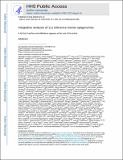Integrative analysis of 111 reference human epigenomes
Author(s)
Kundaje, Anshul; Meuleman, Wouter; Ernst, Jason; Yen, Angela; Kheradpour, Pouya; Zhang, Zhizhuo; Wang, Jianrong; Ward, Lucas D.; Sarkar, Abhishek Kulshreshtha; Quon, Gerald; Eaton, Matthew Lucas; Wu, Yi-Chieh; Pfenning, Andreas R.; Wang, Xinchen; Claussnitzer, Melina; Liu, Yaping; Bansal, Mukul S.; Kim, Ah Ram; Cowper Sal-lari, Richard; Sinnott-Armstrong, Nicholas A.; Gjoneska, Elizabeta; Tsai, Li-Huei; Kellis, Manolis; Feizi- Khankandi, Soheil; Boyer, Laurie Ann; ... Show more Show less
DownloadKellis_Integrative analysis.pdf (13.69Mb)
OPEN_ACCESS_POLICY
Open Access Policy
Creative Commons Attribution-Noncommercial-Share Alike
Terms of use
Metadata
Show full item recordAbstract
The reference human genome sequence set the stage for studies of genetic variation and its association with human disease, but epigenomic studies lack a similar reference. To address this need, the NIH Roadmap Epigenomics Consortium generated the largest collection so far of human epigenomes for primary cells and tissues. Here we describe the integrative analysis of 111 reference human epigenomes generated as part of the programme, profiled for histone modification patterns, DNA accessibility, DNA methylation and RNA expression. We establish global maps of regulatory elements, define regulatory modules of coordinated activity, and their likely activators and repressors. We show that disease- and trait-associated genetic variants are enriched in tissue-specific epigenomic marks, revealing biologically relevant cell types for diverse human traits, and providing a resource for interpreting the molecular basis of human disease. Our results demonstrate the central role of epigenomic information for understanding gene regulation, cellular differentiation and human disease.
Date issued
2015-02Department
Massachusetts Institute of Technology. Computer Science and Artificial Intelligence Laboratory; Massachusetts Institute of Technology. Department of Biology; Massachusetts Institute of Technology. Department of Brain and Cognitive Sciences; Massachusetts Institute of Technology. Department of Electrical Engineering and Computer Science; Picower Institute for Learning and MemoryJournal
Nature
Publisher
Nature Publishing Group
Citation
Kundaje, Anshul, Wouter Meuleman, Jason Ernst, Misha Bilenky, Angela Yen, Alireza Heravi-Moussavi, Pouya Kheradpour, et al. “Integrative Analysis of 111 Reference Human Epigenomes.” Nature 518, no. 7539 (February 18, 2015): 317–330.
Version: Author's final manuscript
ISSN
0028-0836
1476-4687